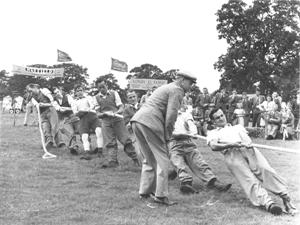Press Release: Celebrating our sporting heritage as Olympic torch arrives
-
Author
- Alison Hilton
-
Published Date
- July 9, 2012
 As the crowds gather to welcome the Olympic torch to Reading, the Museum of English Rural life at the University of Reading is reflecting the influence English country heritage has had in world sport – including helping provide the spark for the modern Olympics.
As the crowds gather to welcome the Olympic torch to Reading, the Museum of English Rural life at the University of Reading is reflecting the influence English country heritage has had in world sport – including helping provide the spark for the modern Olympics.
The torch will come to Reading on Tuesday evening (10 July), carried along the A4 London Road between 6.14pm and 6.34pm, before an evening celebration at the Madejski Stadium, where the flame will be kept overnight before continuing its journey around Britain the following morning.
Just yards away from the official route, the Museum of English Rural Life (MERL), part of the University of Reading’s London Road campus, will stay open until 9pm on Tuesday to give anyone coming to the area the chance to visit the exhibition Playing Fields: Our Sporting Life in the Countryside. The exhibition, which runs until 16 September and is free of charge, takes a look at the rural sports that changed the world – and one or two that didn’t.
The opening ceremony of the London 2012 Games will feature the British countryside and farmyard animals, acknowledging the importance of rural life in shaping modern Britain. Playing Fields is an opportunity to look back with pride and to enjoy and explore a peculiarly rural, and peculiarly British, take on sport. It also showcases the influence of rural life and rural sport on the Olympic movement. For instance, the Olympic ideal owes much to the market town of Much Wenlock, Shropshire, a quiet English parish in which a local agricultural society promoted the idea of an Olympian Class prior to the re-establishment of the modern Olympics by Pierre de Coubertin in 1896.
With items drawn from the museum’s diverse collections, Playing Fields takes a light-hearted look at major sports like football and cricket, the roots of which lie partly in traditional rural contests. It also sheds light on less familiar but equally fascinating activities, from the thorny challenges of competitive hedging to the little-known ballgame knur and spell.
Guy Baxter, of MERL, said: “We were delighted to discover that Danny Boyle, the director of the Olympic opening ceremony, had singled out the influence of rural life in Britain as the key message of the opening event. MERL is about recording our rural past and helping people to learn about it.
“Rural sports, from cricket on the green to tennis on the lawn, have had a massive influence on our culture, and on the wider world. It’s great that we can celebrate these sports, in Olympic year, with a free exhibition that is both fun and informative, and we’re even more pleased to be able to extend our opening to coincide with the arrival of the Olympic torch to Reading.”
This display forms part of a project co-ordinated by the Heritage Sports Network to showcase the wealth of sporting history in the United Kingdom. This national exhibit explores the huge contributions made by British sportsmen and women over the last century.
ENDS
For more information about the exhibition, visit www.reading.ac.uk/merl or call 0118 378 8660.
For more information for media, contact Pete Castle at the University of Reading press office on 0118 378 7391 or p.castle@reading.ac.uk.
Follow us on Twitter | Like us on Facebook | Read our research blog ‘The Forum’
Notes to editors:
MERL, part of the University of Reading, draws on and adds to the University’s unique research into agriculture, history and rural practices, and has collections permanently open to the public at the University’s historic and recently refurbished London Road campus.





